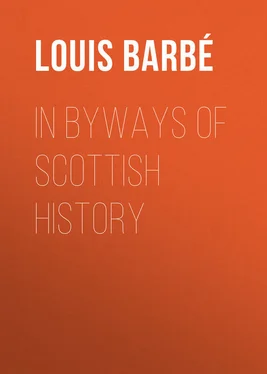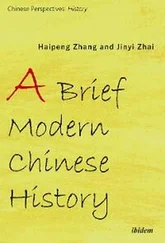Louis Barbé - In Byways of Scottish History
Здесь есть возможность читать онлайн «Louis Barbé - In Byways of Scottish History» — ознакомительный отрывок электронной книги совершенно бесплатно, а после прочтения отрывка купить полную версию. В некоторых случаях можно слушать аудио, скачать через торрент в формате fb2 и присутствует краткое содержание. Жанр: foreign_antique, foreign_prose, на английском языке. Описание произведения, (предисловие) а так же отзывы посетителей доступны на портале библиотеки ЛибКат.
- Название:In Byways of Scottish History
- Автор:
- Жанр:
- Год:неизвестен
- ISBN:нет данных
- Рейтинг книги:4 / 5. Голосов: 1
-
Избранное:Добавить в избранное
- Отзывы:
-
Ваша оценка:
- 80
- 1
- 2
- 3
- 4
- 5
In Byways of Scottish History: краткое содержание, описание и аннотация
Предлагаем к чтению аннотацию, описание, краткое содержание или предисловие (зависит от того, что написал сам автор книги «In Byways of Scottish History»). Если вы не нашли необходимую информацию о книге — напишите в комментариях, мы постараемся отыскать её.
In Byways of Scottish History — читать онлайн ознакомительный отрывок
Ниже представлен текст книги, разбитый по страницам. Система сохранения места последней прочитанной страницы, позволяет с удобством читать онлайн бесплатно книгу «In Byways of Scottish History», без необходимости каждый раз заново искать на чём Вы остановились. Поставьте закладку, и сможете в любой момент перейти на страницу, на которой закончили чтение.
Интервал:
Закладка:
For the next nine years Mary Seton disappears almost entirely in the monotony of her self-imposed exile and captivity. A casual reference to her, from time to time, in the Queen's correspondence, is the only sign we have of her existence. Thus, in a letter written from Chatsworth, in 1570, to the Archbishop of Glasgow, to inform him of the death of his brother, John Beton, laird of Creich, and to request him to send over Andrew Beton to act as Master of the Household, Mary Stuart incidentally mentions her maid of honour in terms which, however, convey but little information concerning her, beyond that of her continued devotion to her mistress and her affection for her mistress's friends. "Vous avez une amye en Seton," so the Queen writes, "qui sera aussi satisfayte, en votre absence, de vous servir de bonne amye que parente ou aultre que puissiez avoir aupres de moy, pour l'affection qu'elle porte à tous ceulx qu'elle connait m'avoyr esté fidéles serviteurs."
The royal prisoner's correspondence for the year 1574 gives us another glimpse of her faithful attendant, "qui tous les jours me fayct service tres agreable," and for whom the Archbishop is requested to send over from Paris a watch and alarum. "La monstre que je demande est pour Seton. Si n'en pouvez trouver une faite, faites la faire, simple et juste, suyvant mon premier mémoyre, avec le reveil-matin à part." 101
Three years must again elapse before Mary Seton's next appearance. On this occasion, however, in 1577, she assumes special importance, and figures as the chief character in a romantic little drama which Mary Stuart herself has sketched for us in two letters written from her prison in Sheffield to Archbishop Beton.
It will be remembered that when, in 1570, death deprived Queen Mary of the services of John Beton, her Master of the Household, she requested that his younger brother should be sent over from Paris to supply his place. In due time Andrew Beton appeared at Sheffield and entered upon his honourable but profitless duties. He was necessarily brought into daily contact with Mary Seton, for whom he soon formed a strong affection, and whom he sought in marriage. The maid of honour, a daughter of the proud house of Winton, does not appear to have felt flattered by the attentions of Beton, who, though, "de fort bonne maison", according to Brantôme, 102was but the younger son of a younger son. Despairing of success on his own merits, Andrew Beton at last wrote to his brother, the Archbishop, requesting him to engage their royal mistress's influence in furtherance of his suit. The Queen, with whom, as we know, match-making was an amiable weakness, accepted the part offered her, and the result of her negotiations is best explained by her own letter to the Archbishop: —
According to the promise conveyed to you in my last letter, I have, on three several occasions, spoken to my maid. After raising several objections based on the respect due to the honour of her house – according to the custom of my country – but more particularly on the vow which she alleges, and which she maintains, can neither licitly nor honourably be broken, she has at last yielded to my remonstrances and earnest persuasions, and dutifully submitted to my commands, as being those of a good mistress and of one who stands to her in the place of a mother, trusting that I shall have due consideration both for her reputation and for the confidence which she has placed in me. Therefore, being anxious to gratify you in so good an object, I have taken it upon myself to obtain for her a dispensation from her alleged vow, which I hold to be null. If the opinion of theologians should prove to coincide with mine in this matter, it shall be my care to see to the rest. In doing so, however, I shall change characters, for, as she has confidently placed herself in my hands, I shall have to represent not your interests, but hers. Now, as regards the first point, our man, whom I called into our presence, volunteered a little rashly, considering the difficulties which will arise, to undertake the journey himself, to bring back the dispensation, after having consulted with you as to the proper steps to be taken, and to be with us again within three months, bringing you with him. I shall request a passport for him; do you, on your part, use your best endeavours for him; they will be needed, considering the circumstances under which I am placed. Furthermore, it will be necessary to write to the damsel's brother, to know how far he thinks I may go without appearing to give too little weight to the difference of degree and title. 103
After having penned this interesting and well-meaning epistle, the Queen communicated it to Mary Seton, to whom, however, it did not appear a fair statement of the case, and for whose satisfaction a postscript was added: —
I have shown the above to the maiden, and she accuses me of over-partiality in this, that for shortness' sake, I have omitted some of the circumstances of her dutiful submission to me, in making which she still entertained a hope that some regard should be had for her vow, even though it prove to be null, and that her inclination should also be consulted, which has long been, and more especially since our captivity, rather in favour of remaining in her present state than of entering that of marriage. I have promised her to set this before you, and to give it, myself, that consideration which is due to her confidence in me. Furthermore, I have assured her that, should I be led to persuade her to enter into that state which is least agreeable to her, it would only be because my conscience told me that it was the better for her, and that there was no danger of the least blame being attached to her. She makes a great point of the disparity of rank and titles, and mentions in support of this that she heard fault found with the marriage of the sisters Livingston, merely for having wedded the younger sons of their peers, and she fears that, in a country where such formalities are observed, her own friends may have a similar opinion of her. But, as the Queen of both of them, I have undertaken to assume the whole responsibility, and to do all that my present circumstances will allow, to make matters smooth. You need, therefore, take no further trouble about this, beyond getting her brother to let us know his candid opinion.
With his mistress's good wishes, and with innumerable commissions from her ladies, Andrew Beton set out on his mission. Whether the dispensation was less easy to obtain than he at first fancied, or whether other circumstances, perhaps of a political nature, arose to delay him, twice the three months within which he had undertaken to return to Sheffield had elapsed before information of his homeward journey was received. He had been successful in obtaining a theological opinion favourable to his suit, but it appeared that Mary Seton's objections to matrimony were not to be removed with her vow. This seems to be the meaning of a letter written to Beton by Mary Stuart, in which, after telling him that she will postpone the discussion of his affairs till his return, she pointedly adds that Mary Seton's letters to him must have sufficiently informed him as to her decision, and that she herself, though willing to help him by showing her hearty approval of the match, could give no actual commands in the matter. A similar letter to the Archbishop seems to point to a belief on Mary's part that, in spite of the dispensation, the match would never be concluded, and that Beton would meet with a bitter disappointment on his return to Sheffield. It was destined, however, that he should never again behold either his royal lady or her for whom he had undertaken the journey. He died on his way homewards; but we have no knowledge where or under what circumstances. The first intimation of the event is contained, as are, indeed, most of the details belonging to this period, in the Queen's correspondence. In a letter bearing the date of the 5th of November she expresses to the Archbishop her regret at the failure of her project to unite the Betons and the Setons, as well as at the personal loss she had sustained by the death of a faithful subject and servant. 104
Читать дальшеИнтервал:
Закладка:
Похожие книги на «In Byways of Scottish History»
Представляем Вашему вниманию похожие книги на «In Byways of Scottish History» списком для выбора. Мы отобрали схожую по названию и смыслу литературу в надежде предоставить читателям больше вариантов отыскать новые, интересные, ещё непрочитанные произведения.
Обсуждение, отзывы о книге «In Byways of Scottish History» и просто собственные мнения читателей. Оставьте ваши комментарии, напишите, что Вы думаете о произведении, его смысле или главных героях. Укажите что конкретно понравилось, а что нет, и почему Вы так считаете.












